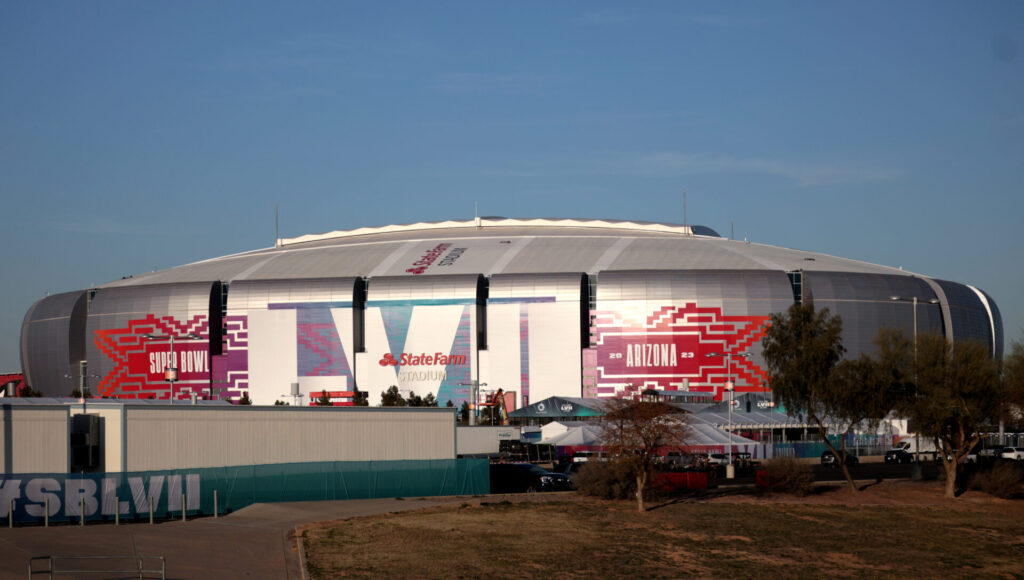
In a joint op-ed published by The Arizona Republic, McCain Institute Senior Director for Combatting Human Trafficking Kristen Abrams and Director of Congressional Affairs at International Justice Mission Nate King write about the widely publicized myth that the Super Bowl causes a spike in human trafficking in its host city.
Abrams and King explain the truth behind the myth and call on Arizonians to become powerful forces in the fight against human trafficking.
Read the full op-ed below.
No, the Super Bowl won’t cause a human trafficking spike in Phoenix
Opinion: There is no proof that the Super Bowl causes human trafficking to spike in its host city. Perpetuating this myth can do real harm.
By Kristen Abrams and Nate King
February 10, 2023
Every year at this time, football fans across the country and around the globe ready themselves for the most-watched event in the professional sports calendar. The traditions surrounding the Super Bowl are time honored. The host city rolls out the red carpet to welcome 100,000 visitors and millions of viewers anticipate a great game, entertaining halftime show and catchy commercials. Just as entrenched as those traditions is the annual reminder that the Super Bowl causes human trafficking to spike in its host city. Sounds like a valuable PSA, right? There’s only one problem – it isn’t true.
The widely repeated myth that the Super Bowl (or any other major sporting event) causes an uptick in human trafficking has been debunked repeatedly. Despite this, some reports continue to cause confusion. There is no definitive data that points to a significant increase in trafficking during the Super Bowl.
Here’s what is true: human trafficking, also known as modern slavery, is a massive global problem. A September 2022 report indicated that 28 million people around the world are trapped in conditions of sex trafficking or labor trafficking – a significant increase since the last report six years ago. Sex and labor trafficking exists in every state across the United States and in every country around the world. Put simply, human trafficking is the exploitation of another person for profit.
Many factors other than the Super Bowl cause human trafficking to increase. The pandemic and its aftereffects, new and protracted conflict, poverty, food insecurity, homelessness, and discrimination are among the root causes of human trafficking.
Repeating the Super Bowl myth causes a number of harms. Notably, misplaced attention to “cracking down” on human trafficking at the Super Bowl distorts the truth of what actually drives human trafficking. It can also erroneously cause people to believe that human trafficking mostly, or only, accompanies major sporting events.
Well-meaning Super Bowl anti-trafficking advertisements often use images that are inaccurate and unhelpful. More specifically, many images depict young female victims in chains or bound by rope. In reality, traffickers use much less obvious forms of control, like threats of violence, false promises or control over a victim’s family member. Imagery like this is extremely problematic because if we lead Americans to believe that all trafficking victims will be in chains, they are likely to miss the signs of distress by those we might encounter in our daily life.
Despite our concerns with the myth of human trafficking and the Super Bowl, there is undoubtedly some good that comes from this level of attention. Using the Super Bowl, or other major events, to raise awareness and educate about human trafficking has some benefits. The Super Bowl brings interest, attention and resources to help a host city build or strengthen its response to human trafficking, and the NFL has invested in helping these efforts surrounding this year’s Super Bowl.
Building and strengthening local networks – from training for law enforcement to supporting NGO’s serving survivors – will serve human trafficking victims 365 days a year. This year, with the active coordination and support of the Arizona Human Trafficking Council, the NFL, the Arizona Host Committee, local law enforcement, service providers, the airports, and dozens of other organizations, thousands of stakeholders have been trained about the indicators of human trafficking and how to respond to a potential situation in a victim-centered manner. This increased capacity will serve victims long after the final touchdown.
Armed with the right information, Arizonans can be a powerful force in the fight against trafficking as conscious consumers, grassroots advocates, and informed citizens. Look closely at the products you buy and use your power as a consumer to avoid goods that may have been produced with forced or child labor. Call on your elected officials to strengthen laws and direct funding to vital anti-trafficking efforts. And if you believe you have information about a trafficking situation, contact the National Human Trafficking Hotline.
Kristen Leanderson Abrams is the senior director of combatting human trafficking at the McCain Institute and Nate King is the director of congressional affairs at International Justice Mission and a McCain Global Leader.